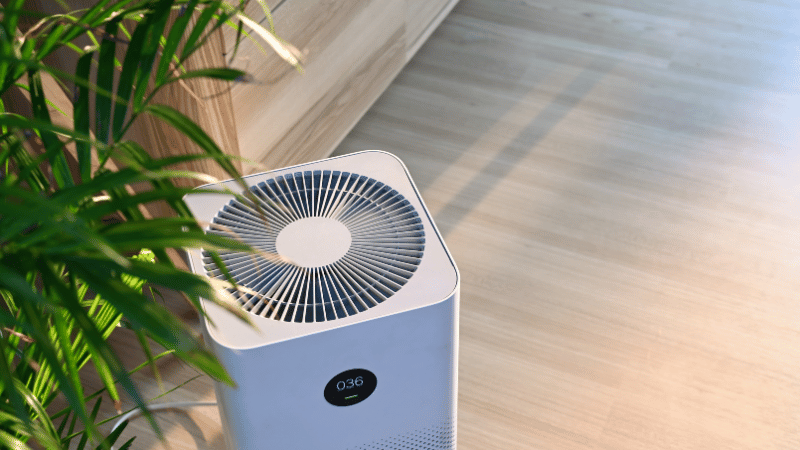Imagine stepping into your vacation home after a long day of travel. You’re tired and ready to relax and suddenly you feel your chest tighten. You start having shortness of breath. A bad migraine and fatigue come upon you followed by itchy skin. For a lot of people, this is their reality and the quality of the air inside a home can significantly impact someone’s health and comfort. The air within some homes can be filled with Volatile Organic Compounds (VOCs) possibly from the furniture, cabinets or flooring. Fragrances and other synthetic chemicals may be lurking in the air from plug-ins, cleaning supplies or laundry detergent. Mold can be hidden behind floorboards and walls. Many of us spend most of our time indoors, making it crucial to ensure that the air we breathe is as clean and healthy as possible. Proper air filter maintenance plays a key role in maintaining a healthy indoor environment. Let’s explore the importance of indoor air quality and how regular air filter maintenance can make a significant difference.
The Importance of Indoor Air Quality
Indoor air quality (IAQ) refers to the condition of the air inside buildings and structures, especially as it relates to the health and comfort of occupants. Poor IAQ can lead to a variety of health problems, ranging from minor irritations to serious respiratory conditions. Here’s why maintaining good IAQ is essential:
Health Benefits
Poor indoor air quality can cause or exacerbate health issues such as allergies, asthma and other respiratory conditions. Contaminants like dust, pollen, pet dander, mold spores and volatile organic compounds (VOCs) can circulate in the air, leading to symptoms like coughing, sneezing, headaches, fatigue, difficulty breathing or skin conditions. Ensuring clean air helps reduce these health risks and promotes overall well-being.
Enhanced Comfort
Clean indoor air contributes to a more comfortable living environment. Proper air filtration can eliminate unpleasant odors and reduce humidity levels, preventing the growth of mold and mildew. A well-maintained HVAC system can also ensure consistent and comfortable temperatures throughout your home.
Improved Productivity
Good IAQ is not only important for health and comfort but also for productivity. Studies have shown that people perform better in environments with clean air, experiencing fewer sick days and higher levels of concentration and cognitive function.
The Role of Air Filters
Air filters are essential components of heating, ventilation and air conditioning (HVAC) systems. They trap dust, dirt, pollen and other airborne particles, preventing them from circulating throughout your home. Over time, however, air filters can become clogged with debris, reducing their effectiveness and impacting your indoor air quality. Regular maintenance, such as, cleaning the air ducts and changing filters are key to ensuring that your HVAC system and air filters function optimally.
Types of Air Filters
There are several types of air filters, each with varying levels of efficiency and suitability for different needs:
Fiberglass Filters
Fiberglass filters are the most basic and inexpensive option. They are designed to protect your HVAC system rather than improve indoor air quality. These filters capture large particles but are not very effective at trapping smaller contaminants.
Maintenance: Replace every 1-2 months.
Pleated Filters
Pleated filters are made from polyester or cotton and offer better filtration than fiberglass filters. They capture a wider range of particles, including dust mites, mold spores, and pet dander.
Maintenance: Replace every 3 months.
High-Efficiency Particulate Air (HEPA) Filters
HEPA filters are highly efficient and can capture 99.97% of particles as small as 0.3 microns. They are ideal for individuals with allergies or respiratory issues and for homes with pets.
Maintenance: Replace every 6-12 months but check more frequently if you have pets or high dust levels.
Activated Carbon Filters
Activated carbon filters contain a layer of charcoal that can absorb odors and VOCs. They are often used in combination with other filters to improve overall air quality.
Maintenance: Replace every 3-6 months, depending on usage and air quality conditions.
Benefits of Regular Air Filter Maintenance
Regular air filter maintenance offers several benefits that contribute to maintaining a healthy indoor environment:
Improved Air Quality
Replacing or cleaning air filters regularly ensures that they can effectively capture and remove airborne contaminants. This leads to cleaner air, reducing the risk of health issues associated with poor IAQ.
Energy Efficiency
A clogged air filter forces your HVAC system to work harder to circulate air, leading to higher energy consumption and utility bills. Regular maintenance helps your system run more efficiently, saving you money and reducing your carbon footprint.
Prolonged HVAC System Lifespan
Clean air filters prevent dust and debris from accumulating in your HVAC system, reducing wear and tear on its components. This can extend the lifespan of your system, preventing costly repairs and replacements.
Tips for Maintaining Air Filters
Here are some practical tips for maintaining your air filters and ensuring good indoor air quality:
Regular Inspection
Check your air filters at least once a month to see if they need cleaning or replacement. This is especially important during seasons when your HVAC system is in heavy use, such as summer and winter.
Follow Manufacturer Guidelines
Always follow the manufacturer’s recommendations for your specific type of air filter. This includes guidelines on how often to replace or clean the filter and any specific maintenance instructions.
Keep Your Home Clean
Regular cleaning and dusting can reduce the amount of debris that ends up in your air filters. Vacuum carpets and rugs frequently and use a damp cloth to wipe down surfaces to prevent dust from becoming airborne.
Control Humidity Levels
Maintain proper humidity levels in your home to prevent mold growth. Use dehumidifiers in damp areas like basements and ensure proper ventilation in kitchens and bathrooms.
Consider Air Purifiers
In addition to your HVAC system, consider using portable air purifiers with HEPA filters in high-traffic areas or rooms where you spend a lot of time. These devices can provide an extra layer of air filtration, especially in homes with pets or individuals with allergies. Maintaining indoor air quality is essential for a healthy and comfortable home. Regular air filter maintenance as well as regular air duct cleaning plays a crucial role in ensuring that your HVAC system effectively removes airborne contaminants, improving the air you breathe. By understanding the importance of clean indoor air and following practical maintenance tips, you can create a healthier living environment for you and your family. Don’t overlook the impact of air quality on your well-being—take the necessary steps to ensure your home is a safe and refreshing haven.

